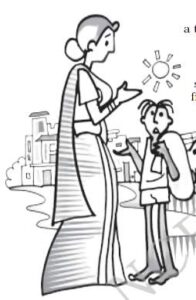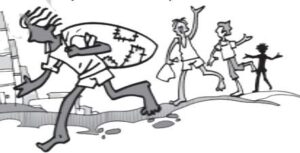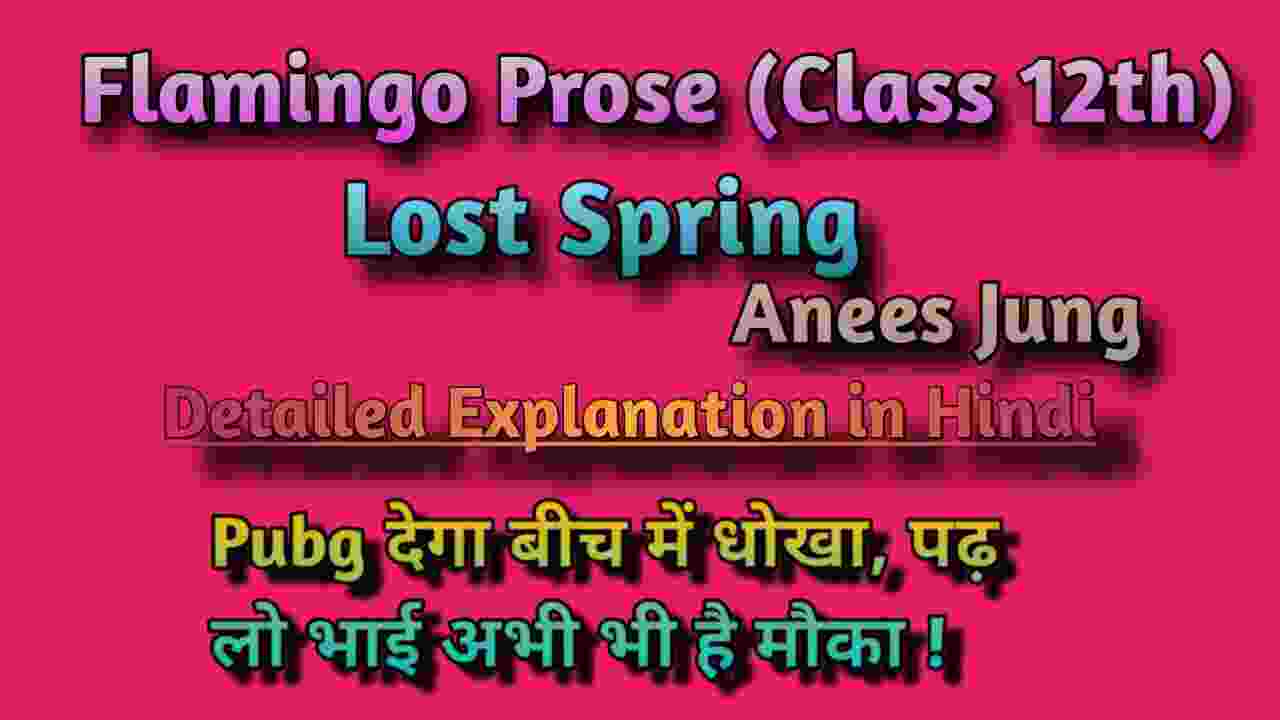The story Lost Spring is originally taken from “Stories of Stolen.” This book is also written by Anees Jung. Check out Lost Spring Summary, Explanation, and Difficult Words and MCQs Online Test
Lost Spring Online Test
Table of Contents
- Results
- #1. Why is the author calling garbage as ‘gold’ in the story?
- #2. The frail woman in Mukesh’s house is his
- #3. Why did Saheb leave his house?
- #4. Saheb-e-Alam has come from?
- #5. What do the boys appear like to the author in the story?
- #6. Is your school ready? Who asked this question?
- #7. Who is the writer of the chapter, Lost Spring?
- #8. The story is an excerpt from…
- #9. What does the survival means in Seemapuri?
- #10. Firzobad is famous for…
- #11. What is the function of glass blowing industry?
- #12. What does the title ‘Lost Spring’ symbolise?
- #13. Why is Saheb not happy working in the tea-stall?
- #14. Which place is known as the colony of rag pickers…
- #15. What are the reasons for the migration of people from villages to city in the lesson?
- #16. Where does Saheb-e-Alam live currently?
- #17. Why did Saheb go through garbage dumps?
- #18. The birthplace of author is…
- #19. What forces conspire to keep the workers in the bangle industry of Firozabad in poverty?
- #20. What explanation does the Children offer for the not wearing footwear?
- #21. How is Mukesh’s attitude different from that of his family?
- #22. What was the profession of Mukesh’s father before he became a bangle-maker?
- #23. Who was Saheb-e- Alam?
- #24. What does ragpicking mean for children?
- #25. Which of the objects below represents the best as a symbol of an Indian woman’s `suhag’?
- #26. What is Mukesh’s dream?
- #27. What change did Anees Jung find in Saheb when she saw him standing by the gate of the neighbourhood club?
- #28. What is the central theme of the story Lost Spring?
- #29. Why did Saheb -e- Alam not go to school?
- #30. The city of Firozabad is known for…
- #31. What forced Saheb to be a ragpicker?
- #32. Where was Saheb employed?
- #33. What does ragpicking mean for parents?
- #34. What is the meaning of Saheb-e-Alam’s name?
- #35. What forces the children to live a life of exploitation?
- #36. The author was born in
- #37. What are the hazards of working in the glass bangles industry?
- #38. What worried the author most about poor bangle makers?
- #39. What efforts can help Mukesh materialise his dream of becoming a car driver?
- #40. What is Saheb looking for in the garbage dumps?
- 1. Lost Spring Author
- 2.Lost Spring Theme
- 3.Lost Spring All Characters Name
- 3.1 Saheb e Alam(lord of the universe)
- 3.2 Mukesh
- Lost Spring Story Video Explanation
- 4. Lost Spring Important Points
- 5. Lost Spring Ncert Solutions (Short Type of Questions)
- 5.1 Think as you Read (Page 17 NCERT)
- 5.2 Think as You Read
- Lost Spring MCQs Video Explanation
- 5.3 Understanding the Text
- 5.4 Talking about the Text
- 6. Lost Spring Summary
- 7. Lost Spring Word Meaning
Results
Congratulations my dear! I am so impressed with your result and hope you’ll continue this series of good marks
Please share this Test on Social Media
Let’s be friends via Social Media:
Download the RCI Academy App for Free Course (Click Here)
English Core Term 1 Complete Video (Click Here)
English Core Term 2 Complete Video (Click Here)

The full form of fail is First Attempt in Life. Work Smart. Better Luck Next Time.
Please share this Test on Social Media
Let’s be friends via Social Media:
Download the RCI Academy App for Free Course (Click Here)
English Core Term 1 Complete Video (Click Here)
English Core Term 2 Complete Video (Click Here)

#2. The frail woman in Mukesh’s house is his
#3. Why did Saheb leave his house?
#4. Saheb-e-Alam has come from?
#6. Is your school ready? Who asked this question?
#7. Who is the writer of the chapter, Lost Spring?
#8. The story is an excerpt from…
#9. What does the survival means in Seemapuri?
#10. Firzobad is famous for…
#11. What is the function of glass blowing industry?
#12. What does the title ‘Lost Spring’ symbolise?
#13. Why is Saheb not happy working in the tea-stall?
#14. Which place is known as the colony of rag pickers…
#15. What are the reasons for the migration of people from villages to city in the lesson?
#16. Where does Saheb-e-Alam live currently?
#17. Why did Saheb go through garbage dumps?
#19. What forces conspire to keep the workers in the bangle industry of Firozabad in poverty?
#20. What explanation does the Children offer for the not wearing footwear?
#21. How is Mukesh’s attitude different from that of his family?
#22. What was the profession of Mukesh’s father before he became a bangle-maker?
#23. Who was Saheb-e- Alam?
#24. What does ragpicking mean for children?
#25. Which of the objects below represents the best as a symbol of an Indian woman’s `suhag’?
#26. What is Mukesh’s dream?
#27. What change did Anees Jung find in Saheb when she saw him standing by the gate of the neighbourhood club?
#28. What is the central theme of the story Lost Spring?
#29. Why did Saheb -e- Alam not go to school?
#30. The city of Firozabad is known for…
#31. What forced Saheb to be a ragpicker?
#32. Where was Saheb employed?
#33. What does ragpicking mean for parents?
#34. What is the meaning of Saheb-e-Alam’s name?
#35. What forces the children to live a life of exploitation?
#37. What are the hazards of working in the glass bangles industry?
#39. What efforts can help Mukesh materialise his dream of becoming a car driver?
#40. What is Saheb looking for in the garbage dumps?
1. Lost Spring Author
She was born in 1964 in Hyderabad in an aristocratic family. She is a writer, columnist, and journalist. She had done her schooling and graduated from her hometown.
She went to the U.S.A for higher education. Jung is still alive.
2.Lost Spring Theme
The narrator targets those children who have missed the joys of childhood. She compares childhood with spring and says that child labour must be eliminated because childhood is one of the best parts of our life.
3.Lost Spring All Characters Name
3.1 Saheb e Alam(lord of the universe)
Saheb – e- Alam is a rag-picking boy. At present, he lives at Seemapuri and has come from Dhaka, Bangladesh. The meaning of his name is Lord of the universe.
The narrator says that it is not a lack of money to stay barefoot but a culture or tradition that the people are blindly following.
The writer promises to start a good school for the boys like Saheb but it remains a dream only. Jung points towards leaders who always cheat the people by making a number of promises.
One day, Jung finds him outside of a club with a discoloured shirt and shorts. He is also wearing a pair of shoes which has a hole in one of them.
These are discarded shoes of some rich boy. He says that he likes to play tennis but it is out of his reach. The gatekeeper sometimes permits him to use a swing.
There are 10,000 rag pickers living at Seemapuri without any permanent house. At the end of the story, Saheb gets a job in a tea stall on the payment of 800 per month but he is not happy there because he has to work there according to pressure and a daily routine.
Anees Jung says here that a child needs nothing but freedom and the same is snatched by this cruel world.

3.2 Mukesh
Mukesh lives at Firozabad, Uttar Pradesh. It is famous for its bangles and a hub of the glass bangles industry. Every second family is engaged in bangle-making work.
He also belongs to a poor bangle-making family. His family members want him to continue the traditional business but he wants to become a motor mechanic that makes him different from his family.
First, he will learn the motor mechanic work after joining a garage which is away from his house. The poor bangle makers polish the bangles in the dark rooms where there is no facility of pure air, water, and lights.
The poor bangle makers have to live in poverty due to the domination of the officers, the middle man, the sahukar, the police, and the other people. They are unable to pay the money lenders.
They also torture them badly. Finally, Anees Jung ask him, ‘Does he dream of flying a plane?” But, he stares at the ground and feels insulted.
The story of Mukesh is enough to bring out an evil social structure where many boys like Mukesh are forced to continue the traditional business except the studies.
Lost Spring Story Video Explanation
4. Lost Spring Important Points
- Saheb lives at Seemapuri, Delhi, and has come from Dhaka, Bangladesh
- He scrounges a rupee in the garbage dumps every morning
- Almost 10,000 rag pickers live at Seemapuri and they value food more than identity. They have no voter id but a ration card through which their hunger goes satisfied.
- Picking rags for elders is a means of survival and it is wrapped in wonders for children.
- The narrator promises to set up a new school but it only remains a dream.
- It is their culture or tradition to stay barefoot.
- One winter morning, the narrator meets saheb outside of a club with his discoloured tennis shoes.
- These are discarded shoes of some rich boy the shoes have a hole in one of them
- He gets the work at a tea stall on the payment of 800 per month but he is not happy there because he is no longer his own master.
- Mukesh lives at Firozabad and belongs to a bangle-making family.
- Firzobad is famous for its bangles. It is a hub of the glass bangles industry…
- His aim is to be a motor mechanic but his family wants him to continue the traditional business.
- Almost 20,000 children are engaged who go blind before being young due to the hot furnaces
- The condition of bangle makers is very critical. They work without fresh air and light at high temperature
- The condition of houses is very critical at Firozabad. There are many houses without windows and doors. The drains are overflowing too.
- The narrator visits Mukesh’s house, meets all his family members. He has also no permanent house to live in.
- Mukesh’s grandfather also loses the brightness of his eyes with the dust from polishing the glass of bangles.
- They can’t organize into a co-operative because of the domination of the politicians, the sahukar, the police, the middleman, the officers, and many others. Finally, the narrator asks “ Does he also dream of flying a plane?”
5. Lost Spring Ncert Solutions (Short Type of Questions)
5.1 Think as you Read (Page 17 NCERT)
1.What is Saheb looking for in the garbage dumps? Where is he and where has he come from?
Saheb is looking for a rupee in the garbage dumps. He is at Seemapuri, Delhi, and has come from Dhaka, Bangladesh. He is a very poor boy and has no good house to live in.
2.What explanation does the author offer for the children not wearing footwear?
The author says that that staying barefoot is the symbol of poverty. It is only a tradition or custom to stay barefoot. Many own the slipper but they are not used to it.
3.Is Saheb happy working at the tea stall? Explain.
Saheb is not happy working at the tea stall because he is no longer his own master now. He has to work under pressure and a daily routine. He needs nothing but the freedom to be his own.
5.2 Think as You Read
1.What makes the city of Firozabad famous?
Firozabad is famous for its bangles. Most of the people living here are engaged in this business and it is also the hub of India’s glass bangles industry. every second family is engaged in this business.
2.Mention the hazards of working in the glass bangles industry?
Working in the glass bangles industry has many hazards. The small children are engaged in the work and lose their eyesight before being young. The people also lack a healthy environment due to the dust generated during polishing bangles.
3.How is Mukesh’s attitude to his situation different from that of his family.
Mukesh belongs to a family of bangle makers. As per the norms of society, he must continue the traditional business. But, he wants to become a motor mechanic. This aim makes him different from his family.
Lost Spring MCQs Video Explanation
5.3 Understanding the Text
1.What could be some of the reasons for the migration of the people from villages to cities?
The people want to grab the opportunity. But, the village can’t afford better opportunities. The people move from villages to cities to get a comfortable and luxurious life. The city also ensures the best education facility.
2.Would you agree that promises made to poor children are rarely kept? Why do you think this happens in the incidents narrated in the text?
Yes, I totally with the statement. The narrator also breaks her promise to start a good school. The leaders always ensure the children for better health and education but always cheat.
3.What forces conspire to keep the workers in the bangle industry of Firozabad in poverty.
The politicians, the officers, the middle man, the police, the sahukar are some of the people who dominate the workers in the bangle industry of Firozabad. They never want them to overcome poverty. The people of Firozabad are under the burden of debt.
5.4 Talking about the Text
1.How, in your opinion, can Mukesh realise his dream?
Mukesh has to follow the quote, “Where there is a will, there’s a way” He has to join a garage and learn the work as an apprentice. He has to travel a little from his house because the garage is away from his house.
2.Why should child labour be eliminated and how?
India is an independent country. All the citizens have the right to conduct a free life. The students are the future of our country. If they will be forced to work in the hotels then the development of the country is not possible. Therefore, child labour must be eliminated. This is possible with utmost kind and love.

6. Lost Spring Summary
The story, Lost Spring has been written by Anees Jung. She raises her voice against child labour which forces the children to miss their childhood.
She finds similarities between childhood and spring. The writer feels pity for those children who are unable to go to school and strongly stand with them. The first story starts with a line, “ sometimes I find a rupee in the garbage.”
It is a painful story of a poor boy named Saheb – e- Alam who is forced to miss the joys of childhood. At present, he lives at Seemapuri and has come from Dhaka, Bangladesh.
The meaning of his name is Lord of the universe. The writer says that it is not a lack of money to stay barefoot but a culture or tradition. The writer promises to start a good school for the boys like Saheb but it remains a dream only.
Jung points towards leaders who always cheat the people by making a number of promises. One day, the writer finds him outside of a club with a discoloured shirt and shorts. He is also wearing a pair of shoes which has a hole.
These are discarded shoes of some rich boy. There is a hole in the shoe. He says that he likes to play tennis but it is out of his reach. The gatekeeper sometimes permits him to use a swing.
There are 10,000 rag pickers living at Seemapuri without any permanent house. At the end of the story, Saheb gets a job in a tea-stall on the payment of 800 per month but he is not happy there because he has to work there according to pressure and a daily routine.
Anees Jung says here that a child needs nothing but freedom.
“I want to drive a car.” The line shows the internal desire of a young boy who wants to become a motor mechanic. His name is Mukesh and lives in Firozabad, Uttar Pradesh.
It is famous for its bangles and a hub of the glass bangles industry. Every second family is engaged in bangle-making work.
He also belongs to a poor bangle-making family. His family members want him to continue the traditional business but he wants to become a motor mechanic that makes him different from his family.
First, he will learn the motor mechanic work after joining a garage which is away from his house. The poor bangle makers polish the bangles in the dark rooms which lack fresh air.
The poor bangle makers have to live in poverty due to the domination of the officers, the middle man, the sahukar, the police, and the other people. They are unable to pay the money lenders.
They also torture them badly. Finally, Anees Jung ask him, ‘Does he dream of flying a plane?” But, he stares at the ground and feels insulted. From above all these two stories, the authoress wants to beautify the childhood which is the source of endless energy and joys.
Join Telegram for FREE PDF | |
Join Whatsapp Group | |
Subscribe our Youtube Channel |
7. Lost Spring Word Meaning
- Filth ( garbage) कूड़ा कचरा
- Encounter (Sudden meet) अचानक मिलना।
- Scrounge (Hunt) ढूढ़ना
- Mutter (Murmur) बड़बड़ाना
- Glibly (Carelessly) लापरवाही से
- Bleak (dim) उदास
- Shuffle (crawl the feet) पैर घसीटना
- Perpetual (permanent) स्थाई
- Desolation (loneliness) खालीपन
- Panting (gasp) हांफना
- Periphery (boundary) सीमा
- Tattered (torn and old) फटी पुरानी
- Transit (temporary camp) अस्थाई डेरा
- Wrapped (covered) लिपटा हुआ
- Discarded (thrown away) फेका हुआ
- Loom (look partially) साफ दिखाई ना पड़ना
- Mirage (illusion) मृग मरीचिका
- Dingy (dismal) अँधेरा और गन्दा
- Crumbling (decay) टुकड़े टुकड़े होना
- Wobbly (shaky) जर्जर
- Primeval (ancient) प्राचीन
- Thatched (straw made roof) छप्पर
- Frail (imperfect) दुर्बल
- Veil (cover) घूँघट
- Impoverished (poverty-stricken) कंगाल
- Lineage (ancestry) वंश
- Drab (gloomy)फीका
- Sanctity (sacredness) पवित्रता
- Mind-numbing (stupefying) सोचने समझने की क्षमता खत्म करना।
- Vicious (cruel) दुराचारी
- Stigma (mark) कलंक
- Hurtling (moving very fast)
Don’t Miss These Important Flaming Prose and Poetry
Poetry
An Elementary School Classroom in a Slum





Thanks for posting this